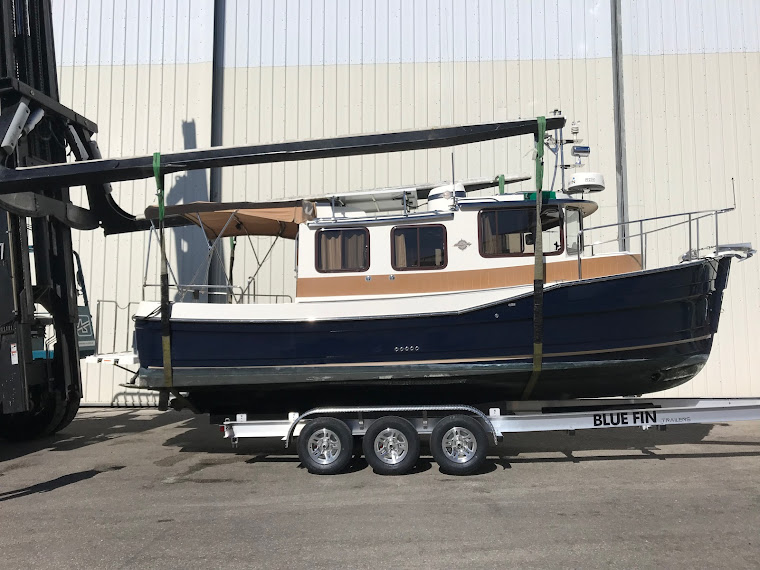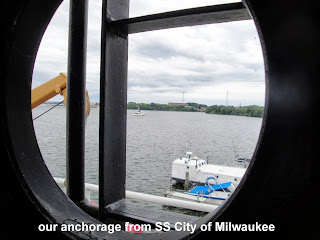Marvelous Manistee
Manistee Lake is home
to the SS City of Milwaukee listed on the National Register of Historic
Places and the last remaining
traditional railroad car ferry – now a museum and boatel. Arriving on the Manistee River we made a stop
at the marina for diesel – it takes a while to fill our tanks, so we spent the
time meeting fellow loopers on Meandering,
Ken and Kathy , and former Krogenites, Julia and Paul who lived aboard their 48 KK for 13 years and
are now cruising on their land yacht. They kindly offered to help us with
transportation if needed. Oh, we also became best friends with the marina
staffer Laura who was filling the tanks.
When we finally made it through the
bridges into the lake, we found our anchorage included a close up view of the SS City of Milwaukee and the Acacia a decommissioned Coast Guard
cutter. Both are open for tours, so we piled the bikes in the dink and headed
for shore. The Acacia is open for
self-guided tours so Steve was able to poke around in every corner for the
thorough inspection. This ship was very much like the one that went out to
search for the Great Lake freighter, SS Bradley
which was lost on Lake Michigan below Beaver Island. While sizable, it would still
be dwarfed by 20 foot waves. No mention
of the Acacia rescuing sailors from
such a storm was made, but its mission did include search and rescue as well as
the more ordinary maintenance of the navigation markers – our familiar green
and red buoys.
The big treat was the
guided tour on the SS City of Milwaukee. For some reason, my preparations on Manistee
made no mention of this site. Since the ship is almost 350 feet long and about
five stores above the water, it is hard to overlook; however, it is not visible
from the main street (River Street) in Manistee. We made the happy discovery because we chose
to anchor in the lake rather than along the river.
We first learned about
the great ships that carried railroad cars across the lakes when we stopped
back at the maritime museum in Ashtabula on Lake Erie. Rather than load and unload rail cars
traveling across the lakes, the railroads built massive ferries to carry the
cars. The SS City of Milwaukee spent
its early career crossing Lake Michigan from Milwaukee, WI to Muskegon, MI.
While primarily designed to transport railroad cars, she also had room for up
to 50 passengers who traveled in rail-like accommodations.
Our guide retired from
service on Great Lake freighters, and his enthusiasm and pride in this old girl
was palpable. He beamed like a new
father as he guided us through the engine room explaining the many reasons this
ship is still around. She was built in
1930 – at the end of the depression when frugal was essential – and she actively carried railcars across the lake
until 1981 when this service was halted. Among her unique qualities is her
reinforced hull so she can break ice and work year-round. She also has very
efficient triple expansion steam engines powered by the cheapest fuel source –
bunker diesel. All of this made her economical to operate compared to newer
vessels, so she has endured. Our tour included the crews’ quarters, galley,
dining areas for crew and passengers, plus the passenger seating area and
staterooms. These staterooms featured bunks similar to those found on train
sleeping compartments, beautifully paneled in oak. In fact, our guide informed us all the
furnishings were original and standard railroad furniture. This passenger area
of the ship is available for overnight stays at very reasonable rates ($25 per
person) on weekends. We also visited the
two pilot houses – they needed two complete stations since the ships backed
into the dock to unload their railcars. Finally, the guide led us through the
“flicker” – a part of the ship that was not planned. The railroads designed
these ships for carrying railcars and unlike most ship designs they did not
utilize every corner. When the crews discovered a large unused space below
deck, they created a hatch and built out the space for their use and strung
lights. It was the flickering lights that gave this reclaimed space its name
which has endured – much like this remarkable historic ship.
In Manistee we also
finally wandered into town to browse the shops and local history museum on River
Street and enjoy the river walk built out over the river on a series of
suspended walkways. For a little post-prandial exercise we walked the streets
of town to see some of the historic homes and buildings. This town boasts a
large collection of restored homes and businesses all within a few short blocks
of the river. In fact, the entire downtown is listed on the National Register
of Historic Places. In the evening we
biked out to the park on Lake Michigan for a free jazz concert – one of the
better groups we have heard this summer and in a perfect scenic location.
























































No comments:
Post a Comment